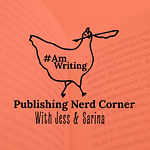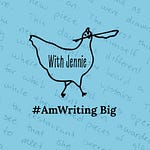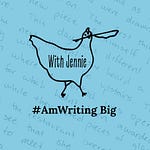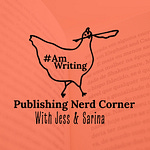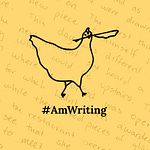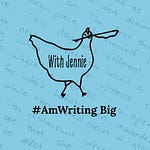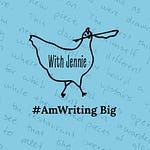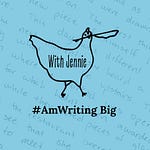I (KJ here) adore Nanowrimo. Tell me it’s impossible to write a whole novel in a month, especially a month with Thanksgiving in it, and I will set out to prove you wrong. My first novel, The Chicken Sisters started as a NaNo project, as did Playing the Witch Card (which is probably coming out in Fall 2023).
I… cannot NaNo this year (yes it’s a verb), because my next set of revisions, with an accompanying deadline, will be heading my way in the last week of October. But Jess can and will!
So I offered Jess my favorite advice on a successful NaNoWritMo—the KJ version, at least. Here’s how I approached last year’s NaNoWriMo, and it worked pretty well in the end:
My first novel clocks in at around 107K, my current WIP draft is at 99K. I favor long, convoluted sentences. I like to express things in sets of three—reasons the character is reacting as she is, emotions that are bombarding her, the ways her body responds— or even five: lists, smells, tastes, memories, expressions and as I have just demonstrated, I tend to use a lot of punctuation while I’m doing it.
I do this from the very beginning. If I’m writing a scene, I write a whole scene. The people move, they eat, they smell and taste and feel, they think about their backstory: the whole shebang. Historically, that’s meant two things. First, when November 30 rolls around, I’ll have 50,000 words—but I’ll only have a draft of about half of my story.
Second, I’ll have put in a lot of time writing those long sentences and and elaborate scenes. The terrible truth about my first drafts is that the writing tends to be pretty good. The dialogue flows, the action moves, there’s humor and pathos and feeling in the way the characters interact with one another.
It’s the story that usually sucks.
Getting to The End, not The Middle
I suspect that to some extent it will always be this way for me. I plot, then I write, then I discover that the plot doesn’t create room to bring the character to the place where she needs to be and I have to go back and do it all over again. But I also suspect I could do that initial finding my way to a character arc and plot that weave together in a way that satisfies the whole a lot more efficiently if I just wrote fewer words.
Make a Plan
To do that, I need a plan that forces me out of my usual loquacious style, and here it is: I divide my 30 days and 50,000 words into a beginning (6 days, 10K) , a middle (18 days, 30K) and an end (6 days and 10K again). World-building and character riffing are fine as long as I stick to the schedule.
Write Some, Pre-write Some or Just Say What Happens
Next, I pay attention to time and word count. If I’m lingering and I need to move along, I throw down some plans and some prewriting. Conversation about the Halloween event here. Town history TK. Some prescient line that recurs at end.
So that’s my weird NaNoWriMo plan: write fewer words, but get more of the whole picture on the page, with the goal of finding my way to “the end” instead of “the middle”. I know (and you know) that it won’t really be the end. There will be much, much work ahead—but I’ll have a draft. It will be a terrible draft, as it should be, but it will help me do the work I find hardest: not writing the scenes but finding the story. If I’m lucky I’ll be putting flesh on the bones; if I’m not, I’ll be rebuilding a scaffolding, not taking down a whole house.
And here, from the archives, is a NaNoWriMo Prep list I created a few years back.
Here’s a fun calendar Sarina found:
And a link to How to Do the Blueprint for a Book Challenge.
A few useful past episodes:
#NaWhateverWriMo, Episode 181
#SupporterMini 1: #Prewriting
#AmWriting
Jess: A Little Too Late, Sarina Bowen
Mad Honey, Jodi Picoult & Jennifer Finney Boylan
All Good People Here, Ashley Flowers *for loving the audio version
KJ:
We All Want Impossible Things, and What Can I Say?, Catherine Newman
Reluctant Immortals, Gwendolyn Kiste
Don’t forget that Author Accelerator is your one-stop for getting a coach on board to help you with your work, no matter where you are in the drafting game. Need a pro? Click here. And if you’ve considered becoming a book coach, here’s your link: Click here.
Also…. you know we here at #AmWriting tend to think working with a book coach or developmental editor is the gold standard for getting help with your project. But that’s not always in the cards—and even if it is, doing as much as you can on your own is always a smart approach.
The developmental editors of Pages & Platforms, Anne Hawley and Rachelle Ramirez, want to share their top tips for editing your own work in a FREE webinar Monday 10/31/22.
YOU WILL LEARN:
Why marketing categories or “genres” don’t help you write a good working story, and what does.
The three most common structural problems with novels and memoirs and how to start solving them.
The importance of good working scenes, and how to fix scenes that don’t work.
Learn more HERE. We’re an affiliate, so we do make a little something if you decide to sign up for additional services. But this is FREE. And please know that we only team up with people and businesses we trust!




